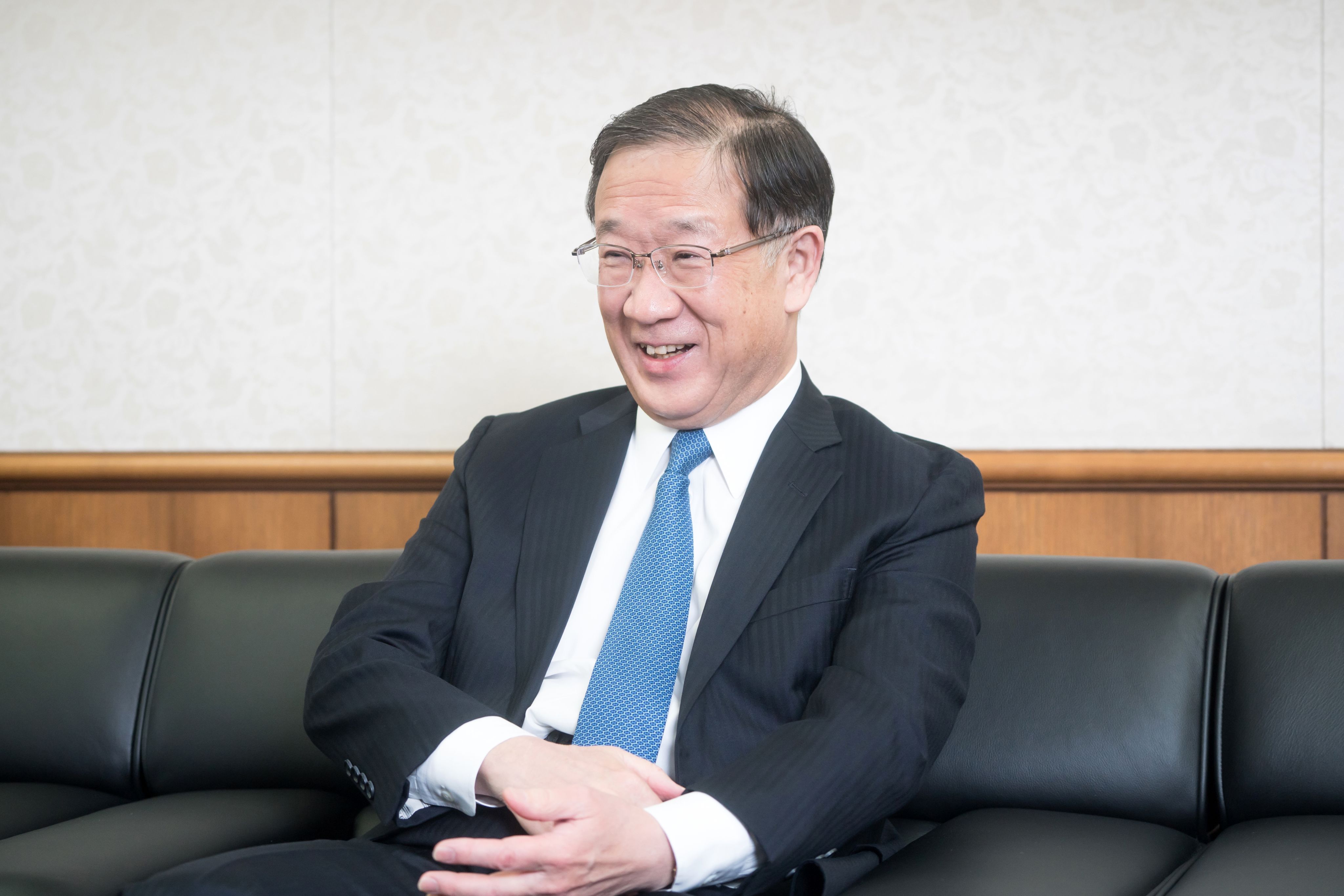Japan's competition chief speaks to MLex
Japan's competition chief speaks to MLex
In an exclusive interview, Japan Fair Trade Commission chairman Kazuyuki Furuya discusses the importance of preparations for the country's new smartphone law, plans to launch a deep dive into Japan's AI market, and the JFTC's pursuit of subcontract law violations.

Pre-launch preparations for Japan's new smartphone law vital to its success, competition chief says
9 July 2024 | 06:59 GMT
By Sachiko Sakamaki and Toko Sekiguchi
Japan’s competition chief told MLex in an exclusive interview that the preparation in the coming months to implement Japan’s new smartphone competition law will be key to its success.
In initial steps since the law’s enactment last month, the antitrust authority has started talks with Big Tech companies like Apple and Google, while Japanese lawmakers have called for arming the regulator with a larger, more qualified staff to take effective enforcement action against global giants with deep pockets.
The calls for a more robust agency have also been taken as an endorsement of the plans by the head of the Japan Fair Trade Competition, or JFTC, to beef up the commission's enforcement regime.
Kazuyuki Furuya, the chairman of the JFTC, recently sat down with MLex, after the Bill for the Act on Promotion of Competition for Specified Smartphone Software received almost unanimous support as it was quickly passed by the Japanese parliament last month.
The first new law to fall entirely under the JFTC’s jurisdiction in nearly seven decades will test the regulator’s ability to redress the massive power imbalance between US tech giants and Japanese businesses — so much so that some Japanese media named these app developers and businesses relying on Big Tech platforms “digital tenant-farmers.”
Art of consensus-building
In spite of the bill’s easy passage, MLex was told there were strenuous behind-the-scene negotiations. Furuya, together with JFTC officials and the Cabinet-Secretariat unit studying the mobile ecosystem since 2021, pushed for the bill’s prompt parliamentary submission, and aligned support among ministries and ministers, as well as ruling and opposition party lawmakers — vital consensus-building steps in Japan’s decision-making process.
“It took us some time for coordination until the bill was submitted to parliament, but in the end, we were able to receive [the lawmakers’] understanding that the bill maintained a balance” between fostering competition and ensuring data security and privacy, he said, referring to persistent concerns among some politicians about data security risks of app stores opening up to third-party stores.
Furuya said that his background as a former assistant chief cabinet secretary — tasked to collaborate with ministries and politicians — and his ability to channel a variety of decisionmakers may have helped. People who worked with Furuya told MLex that his coordination skills and ability to listen to others and to get things done enabled the bill’s smooth passage.
The road to legal implementation
To prepare for the legislation to take effect by December, 2025, the JFTC must first draft cabinet orders by the end of 2024 stipulating the companies that will be subject to the new law, which will be decided based on their business scale. Other key rules and guidelines to be drafted prior to the law’s implementation include data security measures allowing the target companies to protect user privacy and underage minors.
The Japanese smartphone law takes a two-step approach of annual compliance reports filed by the regulated tech companies, and compulsory investigation if a suspected violation is detected, which could lead to a corrective order and a 20 percent fine.
In addition to the compliance reports, the JFTC will also communicate closely with companies, stakeholders and other ministries and overseas regulators.
“We’ll first start with good communication,” said Furuya.
“In drafting the rules and guidelines, we’ll coordinate with Big Tech companies as we’ve done so far, and talk with other Japanese and overseas companies that deal with them. During that process, we’ll probably come to grasp what kind of issues must be addressed,” said Furuya.
He said the European Commission was likely aware of the competition issues involved with each of the regulated parties by the time of Digital Markets Act took full effect in March. That might explain why the regulator was able to swiftly move to launch non-compliance research, he said.
“The preparatory work would be extremely important,” he added.
Reinforcing the JFTC
The chairman is sanguine about prospects for his commission to receive a beefed-up budget and staff for the next fiscal year after bipartisan lawmakers called for strengthening the JFTC's regime to regulate the likes of Google and Apple.
“As parliament called for a sweeping quantitative and qualitative reinforcement of the JFTC to implement the law, we’ll have to seek next fiscal year’s budget and staff with significant determination, including hiring experts with special skills and technological knowledge,” said Furuya, referring to the necessity to substantially expand the digital markets section — currently staffed by a headcount of 14.
Arming app developers for battle
The legislation also has provisions for companies to file injunctions and damages suits if they face damages from violations from regulated tech companies. Japanese parliamentarians also called for the JFTC to issue recommendations and orders should digital giants retaliate against smaller companies who file complaints to the JFTC.
“It’s very important [for Japanese companies] to raise their voices during the first dialogue stage of the new law. I hope the new law will encourage them to do so. Then, it will be more effective and a compulsory investigation or litigation could follow,” the chairman said.
“However, in the end, it’s up to the companies,” Furuya said.
Overseas regulators
Partly due to the tendency by Japanese companies to quietly endure big companies’ exploitative conduct for fear of retaliation, close coordination with not just the EU, but also UK regulators — who introduced a Digital Markets, Competition and Consumers Bill — will become important, said Furuya, who added the JFTC and the Cabinet Secretariat relied on close coordination during market surveys and the smartphone bill’s drafting stage.
“We would like [the global tech companies] to at least take similar measures in Japan as they do in the EU, which has stricter rules, Furuya said.
But he also acknowledged that multinationals may have to operate various business models depending on the discrepancies among jurisdictions when it comes to their ex-ante digital regulations.
“However, some degrees of differences might occur, and that may be acceptable as long as their practices remain compliant with our new legislation and the Antimonopoly Act,” said Furuya.

JFTC to ramp up efforts to help smaller companies raise wages to transform economy, competition chief says
9 July 2024 | 07:04 GMT
By Sachiko Sakamaki and Toko Sekiguchi
As top Japanese companies such as Nissan Motor and a subsidiary of Toyota Motor have become subject to enforcement action against exploitation of their subcontractors, the Japan Fair Trade Commission will continue its efforts to help smaller suppliers to pass on their increased costs, including wages, the head of the JFTC told MLex in an exclusive interview.
The moves come as Japan's economy aims to turn around from a deflationary cycle to a normal growth cycle marked by higher wages and productivity amid mild inflation.
The competition chief also described how the regulator intends to use its position as an antitrust regulator to protect Japanese freelancers, from a business-transaction perspective, through the use of both the newly enacted freelance law and industry-specific guidelines, in order to sidestep labor-law issues.
Kazuyuki Furuya, chairman of the JFTC, told MLex in the recent interview that his agency has played a certain role in bringing the Japanese economy out of a deflationary mindset focusing on cost cuts to where proper prices can be demanded suitable for products and services.
But in an economy where vertical supply chains are typical from manufacturers to retailers and service industries, exploitative abuse by larger players on pricing and other conditions were a major issue in the deflationary economy that has lasted some quarter of a century.
Big automakers
The JFTC’s pursuit of subcontract law violations reached some top automakers recently, as a corrective recommendation was issued in March against Nissan Motor, which included 30 billion yen in refunds, and one against Toyota Motor’s subsidiaries last week.
In the face of public criticisms and the ruling party’s call for “structural wage increases,” some automakers started earmarking funds to help their smaller suppliers, while automotive manufacturing associations also pledged to improve the treatment by their member companies of their suppliers.
“It’s very positive to see our efforts have been a broadening industry-wide impact, but we must continue to spread this move so that the new business practice of passing on costs will be firmly rooted,” Furuya said.
He admitted that the JFTC used unorthodox techniques, such as disclosing the names of companies that were reluctant to allow the passing on of increased costs from smaller suppliers, but emphasized that now is the critical moment to turn around the tide.
“Now the question is whether wage increases will be factored in price settings, based on our guidelines,” said Furuya, referring to the Guidelines on Price Negotiation for Appropriate Pass-through of Labor Costs, published last November, in cooperation with the Cabinet Secretariat.
Subcontract law revision
Also, the JFTC is going to work on revising the Subcontract Act, after the government’s new economic strategy adopted proposals by the ruling party to amend the law to facilitate wage increases by small- and medium-sized enterprises, the chairman said.
“Together with tightening our enforcement by exercising our creativity, we’ll have to consider the institutional revisions from later this year,” Furuya said.
However, he added that careful discussions would be necessary because of conflicting interests among stakeholders, such as those to be regulated under a new mechanism, and smaller companies urged to raise wages despite their thin margins.
Nevertheless, the JFTC, which regulates exploitative abuses under the Antimonopoly Act and the Subcontract Act, will have to continue to make efforts, as the Japanese economy starts showing signs of accommodating more wage increases, amid strong pleas from the government.
“We’re at a junction whether we can shift to a new stage where wages can also rise to keep up with prices, and companies can increase corporate productivity, adding more value, and set prices worthy of their products and services. We’re at a watershed moment, so we must hang in there to push, so we can see normal competition can take place in society,” the chairman said.
Freelance protection and antitrust
Furuya also spoke to MLex about the regulator’s continued efforts to protect independent workers through antitrust law, based on a 2018 JFTC labor study that interpreted the relationship between freelancers and contracting companies as business transactions that fall under the Antimonopoly Act.
That report launched a series of nudges from the regulator in the sports and entertainment world, where athletic organizations and talent management agencies have traditionally imposed restrictions on their talent transferring or becoming independent.
In 2021, the JFTC, together with the labor ministry and related agencies, released a set of guidelines on freelance contracts — a big step for a class of vulnerable workers whose duties and compensation were often outlined in oral agreements.
The chairman said competition issues in the labor market focus on “how to secure fair transactions in the rigid vertical relationship” as opposed to that of the more fluid US or European labor markets, where antitrust issues may arise relating to poaching, non-compete and non-disclosure agreements when workers switch jobs.
As such, the idea to use Japan’s antitrust framework to ensure fairness in the vertical transactions between freelancers and their contractors resulted in the 2023 passage of the freelance protection law, which will be jointly enforced by the JFTC and labor ministry when it takes effect this November.
Promoting IP through content creators
The regulator is expanding on this idea of freelance protection to promote the labor-intensive content industry — namely, entertainment. It has launched a fact-finding survey to study antitrust issues in the relationship between performing artists and their management agencies in music and broadcasting and has said that it will subsequently survey film and animation studios next year.
“While our concern is the opacity in trade practices and work environments in these sectors, the larger goal may be to rejuvenate and promote our content industry as export-worthy,” Furuya said.
The Japanese government’s intellectual property strategy for the year includes the promotion of Japanese exports of creative content, with the goal of turning the tide on the country’s so-called digital and IP trade deficit. The JFTC in recent years has taken on an increasingly important role in establishing the groundwork for the government’s key economic policies, and the deep dive into content creators is one such example.
The JFTC will aim to draft industry guidelines from its findings as a “soft law approach” to improve the status of content creators as a way to boost the industry altogether, Furuya said.
“We have to create a trading environment where the abilities of individuals are properly evaluated. We’re starting by identifying various transactional issues, including the abuse of superior-bargaining position,” the chairman said.

Japan's generative AI market to be studied for competition issues this fall, JFTC chief says
9 July 2024 | 07:06 GMT
By Toko Sekiguchi and Sachiko Sakamaki
Japan’s burgeoning generative artificial intelligence, or AI, market will come under antitrust scrutiny in the fall of this year, as the competition watchdog prepares to launch the first of what its chairman describes as a step-by-step look into the sector.
Kazuyuki Furuya, the chairman of the Japan Fair Trade Commission, or the JFTC, revealed to MLex in a recent interview that he is planning to launch the much anticipated deep dive into Japan’s generative AI market in the coming months, “after a bit of studying [the issue] over the summer.”
“Competition is very active in businesses surrounding generative AI and the market structure itself is still in flux," the chairman said. “I think we may need a different approach such as more agile, step-by-step surveys to keep up with market changes.”
The Japanese regulator has highlighted issues such as dominant players’ access to datasets, self-preferencing, tying and bundling services, and distorting the competitive value of existing creative data through training.
While Furuya said he doesn’t yet see competition problems arising, adding that he envisions industry studies to closely follow the developments in the rapidly growing sector.
“Concerning the development and infrastructure stages, Big Tech competes among themselves regarding foundation models. On the other hand ,we’re seeing Japanese-specific language models. We’re hoping to monitor the market without preconceived notions,” Furuya said.
The Japanese government is actively pushing for the development of home-grown large language models, or LLMs. The JFTC’s task to prevent further entrenchment of Big Tech’s dominance is vital to maintain a level playing field for domestic developers.
Furuya noted that regulators in other jurisdictions have been actively surveying the industry. The Japanese regulator said that the upcoming G7 meeting in Italy, following the one in Tokyo last year, is likely to center around the topic of generative AI.
“We will keep this in mind as we start [our own survey],” the chairman said.
For real-time access to specialist news and deep-dive analysis on regulatory risk across the globe, start your free trial of MLex today.


